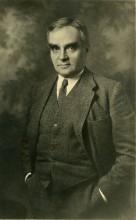new posts in all blogs
Viewing: Blog Posts Tagged with: Harry, Most Recent at Top [Help]
Results 1 - 12 of 12
How to use this Page
You are viewing the most recent posts tagged with the words: Harry in the JacketFlap blog reader. What is a tag? Think of a tag as a keyword or category label. Tags can both help you find posts on JacketFlap.com as well as provide an easy way for you to "remember" and classify posts for later recall. Try adding a tag yourself by clicking "Add a tag" below a post's header. Scroll down through the list of Recent Posts in the left column and click on a post title that sounds interesting. You can view all posts from a specific blog by clicking the Blog name in the right column, or you can click a 'More Posts from this Blog' link in any individual post.

By: Alice,
on 1/27/2013
Blog:
OUPblog
(
Login to Add to MyJacketFlap)
JacketFlap tags:
1951,
constance,
*Featured,
Law & Politics,
Harry S. Truman,
Constance Jordan,
Learned Hand,
Reason and Imagination,
hand’s,
Judge Learned Hand,
President Harry S. Truman,
Selected Letters of Learned Hand,
learned hand,
History,
US,
Current Affairs,
harry,
retirement,
judge,
truman,
Add a tag
Learned Hand was born on this day in 1872. In a letter dated 15 May 1951, Judge Learned Hand wrote President Harry S. Truman to declare his intention to retire from “regular active service.” President Truman responded to Hand’s news with a letter praising his service to the country. These letters are excerpted from Reason and Imagination: The Selected Letters of Learned Hand, edited by Constance Jordan.
To Judge Learned Hand
May 23, 1951
The White House, Washington, D.C.
 Dear Judge Hand:
Dear Judge Hand:
Your impending retirement fills me with regret, which I know is shared by the American people. It is hard to accept the fact that after forty-two years of most distinguished service to our Nation, your activities are now to be narrowed. It is always difficult for me to express a sentiment of deep regret; what makes my present task so overwhelming is the compulsion I feel to attempt, on behalf of the American people, to give in words some inkling of the place you have held and will always hold in the life and spirit of our country.
Your profession has long since recognized the magnitude of your contribution to the law. There has never been any question about your preeminent place among American jurists – indeed among the nations of the world. In your writings, in your day-to-day work for almost half a century, you have added purpose and hope to man’s quest for justice through the process of law. As judge and philosopher, you have expressed the spirit of America and the highest in civilization which man has achieved. America and the American people are the richer because of the vigor and fullness of your contribution to our way of life.
We are compensated in part by the fact that you are casting off only a part of the burdens which you have borne for us these many years, and by our knowledge that you will continue actively to influence our life and society for years to come. May you enjoy many happy years of retirement, secure in the knowledge that no man, whatever his walk of life, has ever been more deserving of the admiration and the gratitude of his country, and indeed of the entire free world.
Very sincerely yours, Harry S. Truman
Hand immediately responded to the President’s letter:
To President Harry S. Truman
May 24, 1951
 Dear Mr. President:
Dear Mr. President:
Your letter about my retirement quite overwhelms me. I dare not believe that it is justified by anything which I have done, yet I cannot but be greatly moved that you should think that it is. The best reward that anyone can expect from official work is the approval of those competent to judge who become acquainted with it; your words of warm approval are much more than I could conceivably have hoped to receive. I can only tell you of my deep gratitude, and assure you that your letter will be a possession for all time for me and for those who come after me.
Respectfully yours, LEARNED HAND
The letters above were excerpted from Reason and Imagination: The Selected Letters of Learned Hand, edited by Constance Jordan, a retired professor of comparative literature and also Hand’s granddaughter. Learned Hand served on the United States District Court and is commonly thought to be the most influential justice never to serve on the Supreme Court. He corresponded with people in different walks of life, some who were among his friends and acquaintances, others who were strangers to him.
Subscribe to the OUPblog via email or RSS.
Subscribe to only law articles on the OUPblog via email or RSS.
Image credit: (1) Harry S Truman. US National Archives. Public domain via Wikimedia Commons. (2) Judge Learned Hand circa 1910. Public domain via Wikimedia Commons.
The post A letter from Harry Truman to Judge Learned Hand appeared first on OUPblog.

Over on his art blog, illustrator Harry Borgman posted an interview he did for The American Artist Book Club back in 1977. It's a short but interesting piece that not only covers Harry's line and ink techniques but also briefly touches on his influences and how he became an author of art books. It's a short read and worth checking out.
Read Harry's interview about ink line drawing.If you would like additional information, you might recall back in January of this year Harry put together a detailed account of his successful career as an illustrator.
Read the Illustration Pages autobiography of Harry Borgman.
The years 1977-1983
In 1977 my wife and I moved to Paris, France, an exciting change in our lives. The illustration business was changing and the automotive assignments were becoming scarce. I decided that I would pursue a fine art career. We had no idea as to just what was ahead of us, and we didn’t know anyone in Paris. I thought that for a while I could do some commercial art to support us until I developed my fine art paintings. I got connected with a small advertising agency, Publiland, and did a lot of graphic design and some illustration work for them. I also was introduced to an art representative, Evelyn Manache. She decided to rep me. She was also repping Milton Glaser of New York. Evelyn got me quite a bit of work, but after a few months I decided to go on my own. I took my samples up to Lintas, one of the largest ad agencies in France. To my surprise, the Creative Director was Bob McClaren, someone that I had helped get a job at Campbell Ewald when I was working there twenty years ago. He was originally from England, then came to Detroit to work, and eventually went back to Europe. This was a real break for me as Bob gave me a lot of work. He even sent me to work in their Vienna offices and to Madrid, Jakarta and Singapore to teach their staffs how to render ads and storyboards. I did work for all of the major ad agencies in Paris but my main source of business was Impact FCB and Lintas.
I was taking French lessons while I was there, but language never was a problem at the ad agencies as they all wanted to practice their English. Jeanne spoke French. Her parents were French Canadian, but the French thought her accent was hilarious. She didn’t mind, as she still was able to communicate.

I did a series of newspaper ads for Intermarche through the ad agency Publiland.
One of my Detroit clients, Wayne Alexander Company, brought over an American Motors Renault catalog for me to design. This is the illustration that I painted for the rear cover.
On top of illustrating, designing and doing paintings, I also began to write a series of “How to...” books for Watson Guptill publications in New York.
All this week On
Illustration Pages we'll be presenting to you the fascinating time line of Harry Borgman, written by the artist himself. Throughout this incredible journey you'll have the opportunity to see the art of Harry Borgman, from present day - going as far back as his early childhood years. We hope you enjoy this rare retrospective of Harry Borgman's art and illustrations, as seen through the eyes of the artist.
I’d like to thank Harry for putting this all together for
Illustration Pages. Harry’s feature is a culmination of many hours of collaboration between he and I - the result is a written record of the career of an artist who was a giant in the field of advertising and one of the most prolific and influential artists of our time. I’m proud that it’s been documented right here on
Illustration Pages.
Introduction by Lou SimeoneHarry Borgman is an artist whose professional career has embraced both the commercial and fine art worlds. He worked for many years as a graphic designer and illustrator before joining the advertising agency Campbell- Ewald in Detroit, where he was head art director on the Chevrolet account designing catalogs, sales promotion material, and later the magazine ads. He has won many awards for his graphic design work and illustrations. After several years working in- agency, Borgman decided he wanted the creative versatility to be found only in freelancing. He worked for major clients in Detroit, Chicago, New York, San Francisco and Los Angeles.

As a teacher he was Chairman of the Advertising Department at the Society of Arts and Crafts (now the College for Creative Studies) in Detroit. His courses included advertising design, illustration and cartooning.
In 1977 he decided to move to Europe and settled in Paris, France where he soon established himself as an artist for the top advertising agencies there. He also worked in the fine arts and exhibited regularly in all of the major French painting salons He also worked in Vienna, Austria, creating automotive campaigns. He was hired by Lintas to teach layout rendering to their art staffs in Jakarta, Singapore as well as in Madrid.
After several years in Europe he moved to New York City where he spent ten years working in advertising doing illustrations and various graphic design projects. He also did much work in the fine arts doing paintings and sculpture whic

By: Rebecca,
on 2/23/2010
Blog:
OUPblog
(
Login to Add to MyJacketFlap)
JacketFlap tags:
Health,
party,
Politics,
Current Events,
A-Featured,
Barack Obama,
Obama,
Budget,
Barack,
health care,
reform,
conservatives,
Harry,
Glenn Beck,
Paul,
Glenn,
Harry Reid,
Reid,
health-care reform,
Reconciliation,
Beck,
Democratic Party,
Budget Reconciliation,
CPAC,
Ron Paul,
CPAC Democratic,
Ron,
Add a tag
Elvin Lim is Assistant Professor of Government at Wesleyan University and author of The Anti-intellectual Presidency, which draws on interviews with more than 40 presidential speechwriters to investigate this relentless qualitative decline, over the course of 200 years, in our presidents’ ability to communicate with the public. He also blogs at www.elvinlim.com. In the article below he looks at health-care reform. See Lim’s previous OUPblogs here.
After attempting a pivot to jobs, the Obama administration has realized that a hanging cadence on health-care will not do. Perhaps they should never have started it, but closure is what the administration now must have. An encore after the strident audacity of hope on health-care reform was temporarily dashed after the election of Scott Brown to the Senate.
In the immediate aftermath of that election, Democrats were in danger of exchanging over-confidence for excessive humility. After Obama’s historic election the year before and Arlen Specter’s party switch, Democrats were overtaken by hubris that Obama’s tune of change could be used to overturn Washington and to compel it toward a Progressive utopia. But just as Democrats were foolhardy to think that 60 votes in the Senate gave them invincible power, they somehow thought after the Massachusetts Senate election that 59 made them completely impotent.
In the media, we hear, conversely, about the conservative comeback in hyperbolic terms. On Saturday, Glenn Beck, not Sarah Palin or Mitt Romney, delivered the keynote speech in the largest annual conservative gathering, the CPAC conference. If Beck’s stardom exceeds that of the winner of the CPAC straw poll this year, Ron Paul, it is because the conservative movement, charged as it is, remains a movement in search of a leader. It is also a movement, as Beck’s criticism of Progressive Republicans in his speech reveals, which is not exactly in sync with the Republican party – the only machine capable of taking down liberal dreams.
And so a Democratic comeback on health-care reform is afoot. With one vote shy of a fillibuster-proof majority, Senator Harry Reid has opened the door to the Budget Reconciliaton process that more Progressive advocates of health-care reform like Governor Howard Dean have been pushing for a while. While it is not clear that there are 50 votes in the Senate for the public option, assuming that Vice-President Biden will cast the 51st, what is clear is that Democrats are much more likely to push through a liberal bill with the veto pivot sliding to the left by ten Senators.
In the White House too, we see a coordinated move to bring Reconciliation back as an option. Obama used his weekly address on Saturday to lay the ground work when he warned that “in time, we’ll see these skyrocketing health care costs become the single largest driver of our federal deficits.” He said this because in order to use Reconciliation, Democrats must show a relationship between health-care reform and balancing the federal budget.
No one in Washington believes that Thursday’s Health-care Summit will magically generate a consensus when in the past year there has been nothing but partisan bickering. If so, the President is not being naive, but signali

By: Rebecca,
on 2/16/2010
Blog:
OUPblog
(
Login to Add to MyJacketFlap)
JacketFlap tags:
party,
Law,
Politics,
Elections,
Current Events,
American History,
A-Featured,
congress,
Barack Obama,
Obama,
Barack,
Harry,
2010,
Democratic,
Democratic Party,
Elections 2010,
Add a tag
Elvin Lim is Assistant Professor of Government at Wesleyan University and author of The Anti-intellectual Presidency, which draws on interviews with more than 40 presidential speechwriters to investigate this relentless qualitative decline, over the course of 200 years, in our presidents’ ability to communicate with the public. He also blogs at www.elvinlim.com. In the article below he looks at Congress. See Lim’s previous OUPblogs here.
On this Presidents Day, it would appear that everyone but the President’s rivals for public affection are doing well in the polls.
Hillary Clinton has shed the image that she is a soft liberal and she is well poised to say, “I told you so,” about her erstwhile charge that Barack Obama lacks experience and fortitude. Even Dick Cheney is doing well, with the public behind him and against civilian trials for terrorist suspects. And we just found out that Evan Bayh is bowing out, probably to escape the anti-incumbency wave on the horizon even though recent polls put him 20 points ahead of his competitors. Given that Bayh left his party less than a week to scramble to collect 4,500 signatures for a viable candidate for his Senate seat, he appears to be setting himself up for a future run as a centrist Democrat who stands up to party apparatchiks. (And here’s another clue: “I am an executive at heart,” Bayh told reporters on Monday.)
The only people doing worse than Obama are Harry Reid, Nancy Pelosi, and the Democratic Congress as a whole. As Evan Bayh put it, “I do not love Congress.” The atmosphere now in Washington is toxic and the poison is leaking down Pennsylvania Avenue and inundating the White House. That is why I am wondering if White House strategists are secretly hoping to lose Democratic control of Congress this year.
The conventional wisdom is that whatever the President proposes, Congress delivers. But not only has this not happened, the failure of Congress to act collectively to pass legislation (especially on
healthcare reform) has tarnished the name of the Democratic Party of which the President is titular head. As a result of the seeming asset of unified Democratic control of all branches of government, Barack Obama could not do what Reagan did when he too suffered from bad poll numbers in his first years in office as a result of recession – blame the other branch. The American people love to hate Congress, and unified Democratic control of all the elected federal branches has merely reinforced the Americans’ instinctive fear of consolidated power as the Tea Party Movement most viscerally represents. The American Presidency thrives on blame avoidance and freedom from party ties, not single-party government.
Because Washington moves so slowly no matter who is in power and when it does it invariably creates a program so sullied with pork-barrel compromises, it is often better to be able to blame someone else for failing to deliver than to have delivered anything at all. Lyndon Johnson doesn’t get high marks from historians for creating Medicare. And FDR’s fame did not come from the Social Security Act. If we do not judge presidential success by legislative achievements, then presidents are better off when they act unilaterally against a recalcitrant Congress. Better still if this Congress is controlled by another party because presidential unilateralism can be executed without dilemma. Barack Obama would then be free to descend from the law professor’s lectern, as Sarah Palin put it, and move, as Publius recommended, wi

By: Rebecca,
on 10/6/2009
Blog:
OUPblog
(
Login to Add to MyJacketFlap)
JacketFlap tags:
Politics,
Current Events,
American History,
A-Featured,
Media,
Afghanistan,
Barack Obama,
Jon,
David,
Harry,
Commander in chief,
Harry Truman,
Douglas,
MacArthur,
armchair generals,
Commander-in-chief,
David Patraeus,
Douglas MacArthur,
Jon Kyl,
Stanley McChrystal,
armchair,
generals,
Patraeus,
Truman,
Kyl,
Obama,
Barack,
Stanley,
McChrystal,
Add a tag
Elvin Lim is Assistant Professor of Government at Wesleyan University and  author of The Anti-intellectual Presidency, which draws on interviews with more than 40 presidential speechwriters to investigate this relentless qualitative decline, over the course of 200 years, in our presidents’ ability to communicate with the public. He also blogs at www.elvinlim.com. In the article below he looks at General Stanley McChrystal. See his previous OUPblogs here.
author of The Anti-intellectual Presidency, which draws on interviews with more than 40 presidential speechwriters to investigate this relentless qualitative decline, over the course of 200 years, in our presidents’ ability to communicate with the public. He also blogs at www.elvinlim.com. In the article below he looks at General Stanley McChrystal. See his previous OUPblogs here.
Sarah Palin is not the only person going rogue these days. In a speech to the International Institute for Strategic Studies in London last Thursday, General Stanley McChrystal advocated for an increase in American troop levels in Afghanistan by 40,000, while rumors that the General would resign his command if his request was not honored remain unquashed. A week before, McChrystal appeared on CBS’s “60 minutes” to spread the word that help is needed in Afghanistan. And before that, he, or one of the supporters of his proposal, leaked a confidential report of his petition to the president to Bob Woodward of The Washington Post, which published a redacted version of it. These are the political maneuverings of a General who understands that wars abroad must also be waged at home.
But, the General fails to understand that the political war at home is not his to fight, and his actions in recent weeks have been out of line. No new command has been issued yet about Afghanistan, but General McChrystal has taken it upon himself to let the British and American public know how he would prefer to be commanded. As it is a slippery and imperceptible slope from preemptive defiance to actual insubordination, as President Harry Truman quickly came to realize about General Douglas MacArthur, President Obama needs to assert and restore the chain of command swiftly and categorically.
As Commander of Special Operations in Afghanistan and Iraq from 2003 to 2008, McCrystal was given free reign to bypass the chain of command. This leeway allowed McCrystal’s team to capture, most illustriously, Saddam Hussein during the Iraq war. But it may have gotten into his head that the discretion Donald Rumsfeld and Dick Cheney granted to him has carried over to his command in Afghanistan. No doubt, McCrystal has been emboldened by supporters of a troop increase in Afghanistan, who have recently chastized President Obama for not having had more meetings with McChrystal. Others, like Senator John Kyl (R-AZ) have on CNN accused the “people in the White House … (as) armchair generals.”
Those who assault the principle of civilian control of the military typically and disingenuously do so obliquely under the cover of generals and the flag, for they dare not confront the fact that the constitution unapologetically anoints an armchair general to lead the military. It is worth noting, further, that in the same sentence in which the President is designated “Commander-in-Chief,” the Constitution states, “he may require the Opinion, in writing, of the principal Officer in each of the executive Departments.” The President may require the opinion of any cabinet secretary should he so choose to do so, but he isn’t even constitutionally obligated to seek the opinion of the Secretary of Defense, to whom General McChrystal’s superior, General David Petraeus, reports via the Chairman of the Joint Chiefs of Staff. General McChrystal has spoken out of turn even though his chain of command goes up quite a few more rings before it culminates in the person seated on an armchair in the Oval Office, and yet I doubt he would take kindly to a one-star general speechifying against his proposal for troop increases in Afghanistan.
Dwight Eisenhower, when he occupied the armchair in the Oval Office, wisely warned of the “Military Industrial Complex” because he understood that it was as much an organized interest as was the Liberal Welfare State, Wall Street, or what would become the Healthcare Industrial Complex. No “commander on the ground” will come to the President of the United States and not ask for more manpower and resources, and Eisenhower understood that the job of the armchair general was to keep that in mind.
Let us not rally around military generals and fail to rally around the Constitution. Inspiring as the Star Spangled Banner may appear flying over Fort McHenry, we will do better to stand firm on the principles etched on an older piece of parchment. As Truman wrote in his statement firing General Douglas MacArthur,
“Full and vigorous debate on matters of national policy is a vital element in the constitutional system of our free democracy. It is fundamental, however, that military commanders must be governed by the policies and directives issued to them in the manner provided by our laws and Constitution.”


By: Rebecca,
on 7/27/2009
Blog:
OUPblog
(
Login to Add to MyJacketFlap)
JacketFlap tags:
President,
press,
A-Featured,
Hillary Clinton,
Obama,
Clinton,
Barack,
Hillary,
public,
health care,
reform,
Bill O'Reilly,
Bill,
Harry,
Henry,
campaign,
Henry Louis Gates,
Louis,
Gates,
permanent campaign,
permanent,
press conference,
President Barack Obama,
Harry Reid,
Reid,
health-care reform,
going public,
O\ Reilly,
going,
Law,
Politics,
Current Events,
American History,
conference,
Add a tag
Elvin Lim is Assistant Professor of Government at Wesleyan University and  author of The Anti-intellectual Presidency, which draws on interviews with more than 40 presidential speechwriters to investigate this relentless qualitative decline, over the course of 200 years, in our presidents’ ability to communicate with the public. He also blogs at www.elvinlim.com. In the article below he looks at Obama’s health care debacle. See his previous OUPblogs here.
author of The Anti-intellectual Presidency, which draws on interviews with more than 40 presidential speechwriters to investigate this relentless qualitative decline, over the course of 200 years, in our presidents’ ability to communicate with the public. He also blogs at www.elvinlim.com. In the article below he looks at Obama’s health care debacle. See his previous OUPblogs here.
As the wise saying goes “if you’ve nothing good to say, don’t say anything.” But President Barack Obama went ahead anyway with a prime time press conference, and as Bill O’Reilly was right to observe on Wednesday night - he said practically nothing specific about what the shape of the health-care bill would look like and viewers were left scratching their heads.
President Obama wanted to let Congress take ownership of the bill, rather than hand them a fait accompli (as Hillary Clinton did back in 1993/4), I hear Democrats chant in his defense. But if Obama wants to stay on the side-lines, then he should do so consistently. Either be genuinely deferential to Congress and stay out of the picture until a consensus emerges, or take complete ownership of the agenda - don’t try to do both. Yet the president is back in the limelight doing prime-time press conferences, and attending town hall meetings in Cleveland and such. Obama should decide which way he wants to go. If he is the salesman-in-chief, then he has to have something to sell, if not his consumers would be left completely befuddled as to why he’s putting on a show for no particular reason at all.
Liberals are mad that Obama didn’t throw a few more punches at Republicans. I think many are unwilling to admit the more pointed fact that he just didn’t do a very good job at all, because he didn’t have much to say.
So Wednesday’s press conference was a squandered opportunity. We are not in 2008 anymore when Barack Obama would announce that he is giving a speech and the whole world would stop to listen. The clock is ticking on his presidential luster, and the next time he says “hey, listen to me,” it’s going to be that much harder.
Let us be clear why health-care reform has stalled, at least till the Fall. Because the Congress, and in particular the Senate Finance Committee could not agree on a way forward. I don’t see why the President and his advisers thought that a prime time press conference last Wednesday night would have gotten things moving. In fact it probably achieved the exact opposite, when we heard on Thursday morning from Senator Harry Reid that a Senate vote before the August recess would not be possible. The president’s time would have been better spent persuading his former colleagues up on the hill in private conversations to compromise on a bill. When they’ve got a bill and all/most are united, then go out and do the media blitzkrieg, by all means. Wednesday night just wasn’t the time for that.
So it looks like the Permanent Campaign is back. The President has chosen to go back to campaign mode, selling himself. Because without a specific plan to sell, all his public appearances amount to going public for the sake of going public. This strategy belies a serious misunderstanding of American politics. Personal approval ratings do not translate to public support for specific policy proposals (not that they were forthcoming) - the president should have known this by now. They barely even translate into congressional support for presidential policies.
This error - of going public with nothing specific to sell - was compounded, and probably encouraged, by a complete underestimation of the push back from the conservative wing of the Demcoratic party (the “Blue Dogs”) worried about spiraling deficits. These were the people Obama should have been talking to. And given he’s still out town hall-ing and speechifying, I’m not sure he fully understands what came over him.
To make matters worse, Obama had to pour fuel over the fire of the Henry Louis Gates controversy during the press conference, accusing the Cambridge police of of a “stupid” arrest when he had incomplete possession of the facts. Have something to say about anything all the time has become the rhetorical ethic of the modern presidency. Obama’s observance of this ethic was a disastrous distraction to what little point he had to make at his press conference. The news cycles are now spending more time covering the Gates controversy than they are covering the health-care debate.
I’m afraid to say - though this is water under the bridge - that Hillary Clinton would have known better. This week, for the first time in his fledgling presidency, Obama looked like a total novice in Washington. His 4th press conference was a waste of time, and probably the first time since Obama broke onto the national scene in 2004 that his rhetorical wizardry had fallen so flatly on death ears. He seems to have bought the bad conventional advice - whenever you’re in trouble, just go out and give a speech - wholesale. The president should take heed:
1. The public is less attentive between election years and he must have something meaningful to say if he wants to keep their attention.
2. Especially on a complex issue like health-care where there are too many details to cover, the media is much more likely to jump at an opportunity to take the path of least resistance to cover something juicier, like Henry Louis Gates and racial profiling.
2. Just because the public (still) loves Obama doesn’t mean that they will love what he is doing as president (and not as presidential candidate).
3. It is often more important to talk to members of Congress - the people who actually pass legislation - than to deliver speeches around the nation where the only tangible return of applause is a fleeting sense of psychic gratification that one is loved.
President Obama, it’s crunch time. Stop yakking.


By: Rebecca,
on 2/16/2009
Blog:
OUPblog
(
Login to Add to MyJacketFlap)
JacketFlap tags:
Politics,
Current Events,
A-Featured,
government,
Barack Obama,
Obama,
Barack,
Harry,
Nancy Pelosi,
economic stimulus,
Economic,
stimulus,
bipartisanship,
divided government,
Harry Reid,
divided,
Reid,
Nancy,
Pelosi,
Add a tag
Elvin Lim is Assistant Professor of Government at Wesleyan University and author of The  Anti-intellectual Presidency, which draws on interviews with more than 40 presidential speechwriters to investigate this relentless qualitative decline, over the course of 200 years, in our presidents’ ability to communicate with the public. He also blogs at www.elvinlim.com. In the article below he reflects on the economic stimulus bill. In the article below he reflects on how the Republicans are doing in the Obama administration. Read his previous OUPblogs here.
Anti-intellectual Presidency, which draws on interviews with more than 40 presidential speechwriters to investigate this relentless qualitative decline, over the course of 200 years, in our presidents’ ability to communicate with the public. He also blogs at www.elvinlim.com. In the article below he reflects on the economic stimulus bill. In the article below he reflects on how the Republicans are doing in the Obama administration. Read his previous OUPblogs here.
The unity and clarity of message exhibited by the Republicans this past week seemed to suggest that they have found their role as loyal opposition in minority. This may be, but Republicans have an uphill battle before them. This week in politics, it was the President who won.
Bipartisanship only became a governing keyword in the 20th century because of the frequency of divided party control over the different branches of government. The fact is there is no need for
bipartisanship when a majority exists in the Congress, and the Republicans know it. This is why they have tried to make a virtue out of bipartisanship as an end in itself, decrying the way in which the economic stimulus bill was passed.
Yet Republicans were complaining about a 1,100 page bill that nobody had perused at the same time that they were arguing that it was a bill of pork and spending. Here’s the problem: the more Republicans made a stand against the process by which their input was stymied, the less credibility they had making a stand against the substance of the bill. So the wisest Republicans focused most of their attack on the process, because accusing the Democrats for not consulting with them is a face-saving strategy on the off-chance that the stimulus package actually works. In 2010, we shall see if their gamble paid off.
The truth is it is not easy being in the minority. In the run-up to the passage of the bill in the Senate, everywhere we heard that 60 was the new 50. But this may have been a higher bar than was necessary for the Democrats to cross. The fact is 50 may well have been enough, given the high political cost the Republicans would have had to bear if they filibustered a bill in a moment of perceived economic
emergency. As it is, Democrats are already accusing the opposition party for becoming the obstructionist party.
The President has only stood to gain from the Democrats’ victory in Congress. When the revised conference bill passed in the House, Congressional Democrats lavished praise on the president, even though they were the ones who had crafted and delivered on the bill. All the president did was go on the road in the final days before passage to sell it. This is hands-off leadership that has benefited him, because the cries of foul from the Republican aisle are mostly being leveled on congressional Democrats, not the president. But Obama’s gain does not come without strings. Both Nancy Pelosi and Harry Reid know that he needs them, so it is unclear for how long he would be able to stand above party in his hitherto futile effort to chase the ghost of bipartisanship.
For now, President Obama has won the battle, and the honeymoon is still his to enjoy. The stimulus package may have more spending than tax cuts in it, as Republicans assert, but congressional majorities agree with him that such spending is necessary. Without income support (making up $100 billion of the bill), unemployed workers would be forced to reduce spending, thereby causing a vicious contractionary circle. If the federal government did not offer support to cash-strapped state and local governments (making up $250 billion of the bill), more jobs would be lost, or so modal opinion seems to hold. The Daschle and Gregg nomination embarrassments reveal the danger of making lofty promises on the campaign trail that the reality of government may not permit, but they also pale in comparison to the significant achievement of passing the biggest economic stimulus package in US history. If the president’s fortunes tell us anything, they suggest that the Republican minority have not yet found their
footing.



By: Rebecca,
on 1/5/2009
Blog:
OUPblog
(
Login to Add to MyJacketFlap)
JacketFlap tags:
Maynard,
A-Featured,
Milton Friedman,
Mitch McConnell,
Keynes,
Milton,
Friedman,
Mitch,
McConnell,
Read,
John,
Harry,
Current Events,
Politics,
Barack Obama,
economic stimulus,
Harry Read,
John Maynard Keynes,
stimulus,
Obama,
Barack,
Economic,
Add a tag
Elvin Lim is Assistant Professor of Government at Wesleyan University and author of The  Anti-intellectual Presidency, which draws on interviews with more than 40 presidential speechwriters to investigate this relentless qualitative decline, over the course of 200 years, in our presidents’ ability to communicate with the public. He also blogs at www.elvinlim.com. In the article below he looks at Obama’s stimulus package. Read his previous OUPblogs here.
Anti-intellectual Presidency, which draws on interviews with more than 40 presidential speechwriters to investigate this relentless qualitative decline, over the course of 200 years, in our presidents’ ability to communicate with the public. He also blogs at www.elvinlim.com. In the article below he looks at Obama’s stimulus package. Read his previous OUPblogs here.
President-elect Obama’s big stimulus package is getting bulkier and more complex by the day. No longer confident that the Congress would be able to move quickly to deliver legislation for the newly sworn in president to sign, Senate Majority Leader Harry Reid has tampered expectations by rejecting a “false deadline” for such a delivery.
As is always the case in Washington, we are scheduled for a clash of ideologies even as we seek a solution to our current economic woes. The Republicans want deliberation (or delay) and fiscal restraint and the Democrats want, well, big government. Cognizant of this, Senate Minority Leader Mitch McConnell has already registered his wariness of “very big systemic changes” proposed in the stimulus package. Republican leaders have taken to calling the proposed $800 billion stimulus package a “trillion dollar” package even though about 40% of it will pay for tax cuts all sides agree on.
But Democrats are likely to prevail in this battle not only because of their store of electoral goodwill locked into congressional majorities, but also because economic history is presently on their side. Traditional monetary policy becomes increasingly ineffective as interest rates fall (because rates cannot fall below zero). The fact is that the banks are still not lending enough. Just in the last three months, cash holdings in banks have tripled to over 1 trillion dollars, according to the Federal Reserve. Other drivers of growth are also unavailable to us this time round. Inventory rebuilding was a powerful engine of growth in 1976, as was residential construction 1992, while consumer spending helped in 2002 (recall President Bush’s invitation for Americans to go out and shop after Sep. 11). The private sector in 2009 is moribund.
This is why Fed officials and economists have come out in support of a fiscal stimulus package. “If ever, in my professional career, there was a time for active, discretionary fiscal stimulus, it is now,” said Janet Yellen, San Francisco Fed president. According to Allen Sinai, chief global economist at Decision Economics in New York, “When we do recover, the engine will be government spending, not home building or the consumer.” John Maynard Keynes, not Milton Friedman, is the dead economist du jour.
Since the September 2008 Wall Street crash, the S.& P. has moved more than 5 percent in either direction on 18 days. There were only 17 such days in the previous 53 years, according to calculations by Howard Silverblatt, an index analyst at S.& P. If the invisible hand of the market cannot calm its own nerves, then government must.

By:
Steve Novak,
on 5/16/2008
Blog:
Steve Draws Stuff
(
Login to Add to MyJacketFlap)
JacketFlap tags:
design,
movie,
rambo,
funny,
shirt,
dead,
indiana,
three,
jones,
zombie,
potter,
skull,
ache,
crystal,
back,
harry,
temple,
hobble,
annoying,
muppet,
Add a tag
.jpg?picon=834)
By:
Mary Cunningham,
on 11/21/2007
Blog:
Cynthia's Attic Blog
(
Login to Add to MyJacketFlap)
JacketFlap tags:
family mystery,
book festival,
friendship,
adventure,
cynthia's attic,
Savannah,
family mystery,
cynthia's attic,
Savannah,
Add a tag

As you know, last weekend I attended the Savannah Children's Book Festival put on by the Live Oak Public Library, along with several corporate sponsors. What makes this event so special is that participating authors don't pay a cent! Well, other than transportation and lodging. Since it's a 4 1/2 hour drive for us, my husband and I usually arrive on Friday and leave Sunday morning.
The library also sponsors a crab boil on Friday night for all the authors and spouses or friends. Shrimp, sausage, potatoes, chicken (okay, so I'm not sure how chicken fits into a crab boil, or the fact that I didn't see crab-one on the buffet table!), steamed veggies, brownies, and cheesecake are catered. I spent part of the evening looking for a "fellow" author, Shannon, who was also attending the festival. No luck. My only complaint was returning to the hotel on a "brownie high!"
Saturday, the weather was perfect! A little cool in the morning, but, by 10:00AM, I shed my light jacket and was comfortable the rest of the day. I was told by one of the organizers that there were almost double the authors this year as last.
We arrived around 9:00AM for setup. Most of the tables were already taken but I managed to find an empty one. Book boxes were on the table next to me under a shared umbrella, but no author in site, so I began setting up my "goodies" hoping the person next to me would be nice and friendly.
I was just getting ready to set out my books when my "neighbor" walked up and introduced herself. "Hi. I'm Shannon Greenland." I'm sure she was shocked when I gave her a big hug before she realized the unlikely scenario. Strange...out of 48 authors, fellow Quake authors would end up side-by-side. It made the day even more enjoyable.
The only downer was the absence of the third "Cynthia's Attic" book, "Curse of the Bayou." Because of a problem with the printer, they didn't arrive in time for the festival. Since the festival had advertised I'd be signing all three books, several young readers were disappointed. One father/daughter sticks in my mind. They had come specifically to buy "Curse." I could see the disappointment on her face when she turned away. In spite of that, her dad gave me the ultimate compliment. "She not only loves your books," he said, "she loves the way you write."
Can a writer hear anything better than that?
Discover the Magic in Cynthia's Attic!
 Dear Mr. President:
Dear Mr. President:




















[...] View original post here: Obama’s Honeymoon Continues : OUPblog [...]